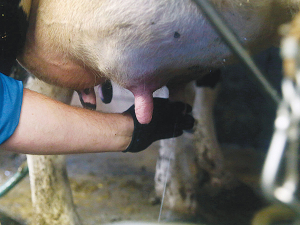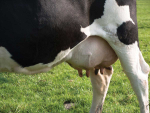Mastitis is the result of complex interaction between bacteria, the farmer, the milking machine and the cow.
Once bacteria enter the udder, the cow's immun system fights infection by producing white blood cells, measured as somatic cell count (SCC).
Depending on the degree of inflammation you may see changes in the milk (clinical mastitis), or no changes in the milk (subclinical mastitis).
Clinical mastitis means cows show symptoms, there is change in milk e.g. clots, watery, blood, heat and/or swelling in udder, reduced milk yield and the cow is off-colour.
Acute chronic infection appears suddenly and is usually relatively short-term infection; there are no symptoms in cow, but high somatic cell count (SCC), or reaction to rapid mastitis test (RMT), and often reduced milk yield.
How does mastitis spread? Mud and muck gets onto teats and causes mastitis, often in spring and is generally caused by streptococcus bacteria.
There can also be cow-to-cow spread; bacteria in the milk of an infected cow will contaminate the cups for the next five cows milked with that cluster. This is commonly caused by staphylococcus bacteria.
There are several ways you can treatment:
1. Clean the teat end, before taking a milk sample or treating the cow.
2. Collect initial milk sample, then either submit to lab for culturing bacteria, or freeze for later.
3. Treat with antibiotics as per veterinary authorisation.
4. Anti-inflammatory treatment will provide pain relief, reduce fever and swelling.
5. If the cow is very unwell, seek veterinary advice.
Four Main Bugs
So what are the bugs that cause mastitis in dairy cows? While there are a huge range of bugs that can cause mastitis, there are four main groups of bacteria responsible for the majority of cases:
- Strep uberis and other Streptococcus species: These are environmental bacteria commonly picked up at or around calving or as cows lie down on the pasture.
- CNS Staph: These bacteria live on the cow's skin.
- Staph aureus: This bacteria is spread from cow to cow during the milking process. Often the infections are sub-clinical causing chronically high cell counts but no clinical sign of mastitis.
- Coliforms (e.g. E coli): These bacteria are found in cow faeces. Many cows will self-cure without showing clinical signs, whilst some animals will become systemically sick and potentially die.


















